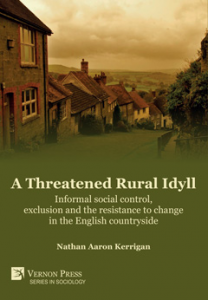RPLC MIRRA Network member, Nathan Kerrigan, launches new book: “A Threatened Rural Idyll”
 Now available from Vernonpress.com – NEW BOOK from Nathan Kerrigan (member of RPLC MIRRA Network), titled, “A Threatened Rural Idyll: Informal social control, exclusion and the resistance to change in the English Countyside.”
Now available from Vernonpress.com – NEW BOOK from Nathan Kerrigan (member of RPLC MIRRA Network), titled, “A Threatened Rural Idyll: Informal social control, exclusion and the resistance to change in the English Countyside.”
About the Author:
Nathan Aaron Kerrigan is a research assistant within the Violence Prevention, Resilience and Justice (VPRJ) research group within the Centre for Behavioural Science at Coventry University in the UK. With a PhD in Social and Community Studies, his research interests centre around rurality and the countryside, globalisation and social change, race, racism and ethnicity, social exclusion, spaces of governance, territorial politics, political governance and informal social control. He has various publications on these issues and has also published a Department for Environment Food and Rural Affairs (DEFRA) evidence report, which explores the impact of tourism on the perceived erosion of English rural identity, as part of the 2016 inquiry on rural tourism in England.
Book Summary
“Issues concerning globalisation, protection of identity and resistance to change at the national level (e.g., Brexit) have been the cause of much public and scholarly debate. With this in mind, this book demonstrates how these national, and indeed global narratives, have impacted on and are influenced by ‘going-ons’ in local contexts. By situating these national narratives within a rural context, Kerrigan expertly explores, through ethnographic research, how similar consequences of informal social control and exclusion are maintained in rural England in order to protect rural identity from social and infrastructural change.
Drawing on observation, participant observation, and in-depth interviews, ‘A Threatened Rural Idyll’ illustrates how residents from a small but developing rural town in the South of England perceived changes associated with globalisation, such as population … growth, inappropriate building developments, and the influx of service industries. For many of the residents, particularly those of middle-class status and long-standing in the town, these changes were seen as a direct threat to the rural character of the town. The investigation highlights how community dynamics and socio-spatial organisation of daily life work to protect the rural traditions inherent in the social and spatial landscape of the town and to maintain the dominance of its largely white, middle-class character. As a result, Kerrigan contends that the resistance to change has the consequence of constructing a social identity that attempts to reinforce the notions of a rural idyll to the exclusion of processes and people seen as representing different values and ideals.”
*Bio and Summary available from Vernonpress.com.
